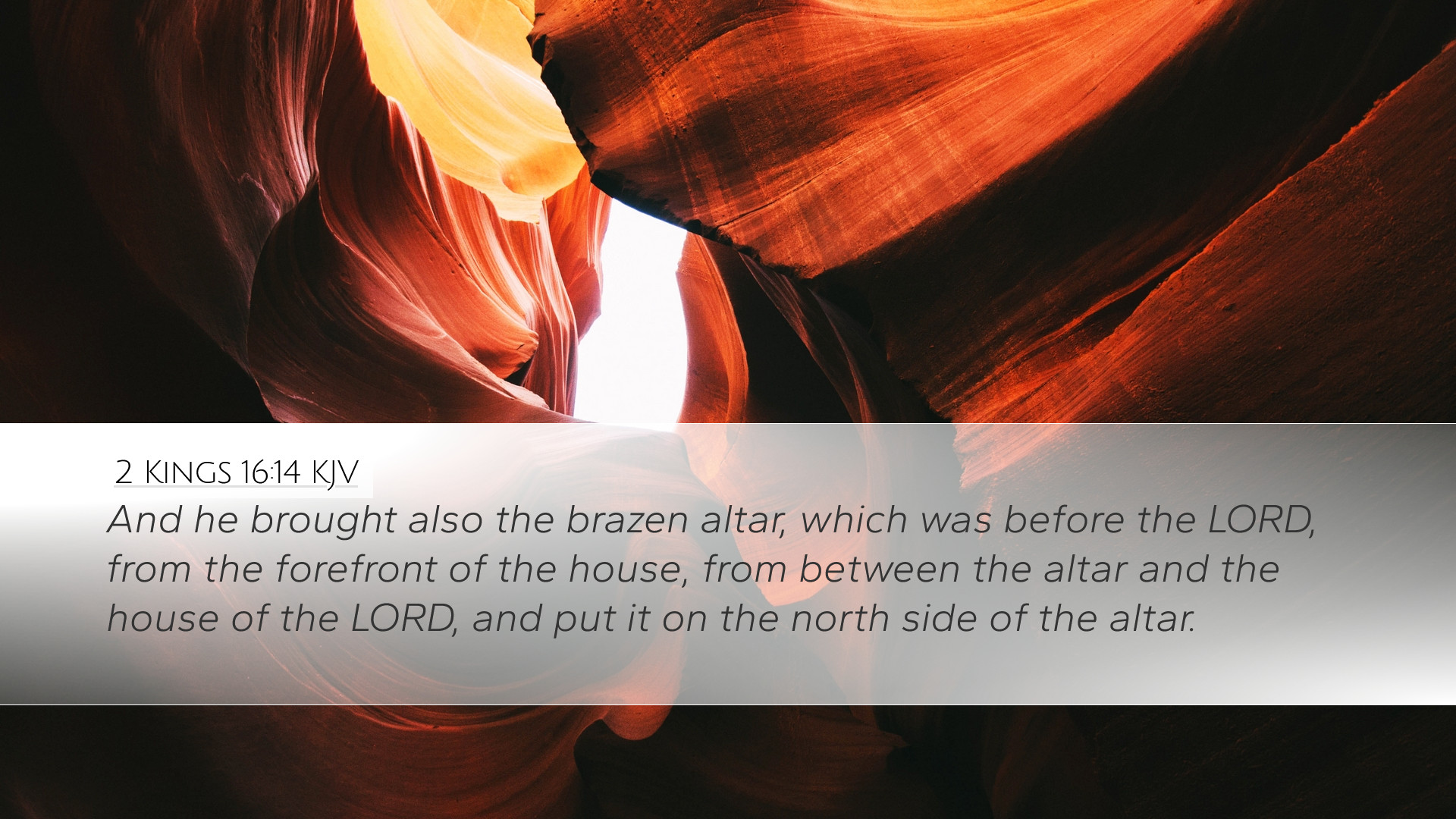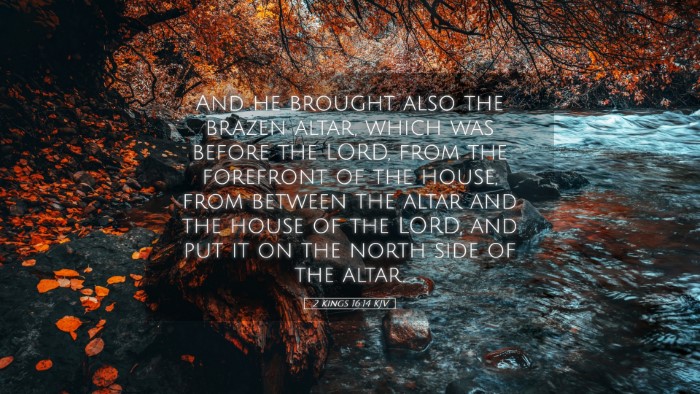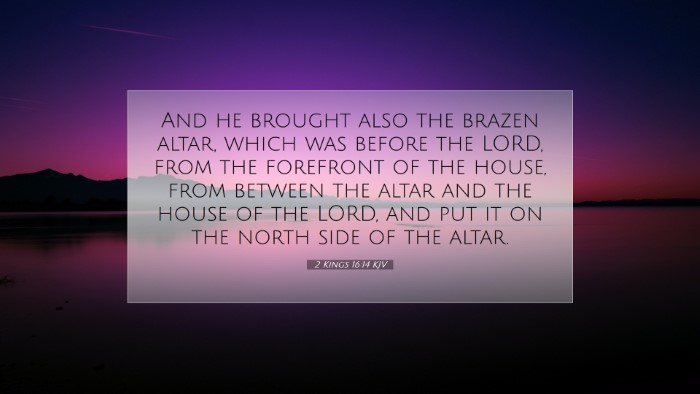Old Testament
Genesis Exodus Leviticus Numbers Deuteronomy Joshua Judges Ruth 1 Samuel 2 Samuel 1 Kings 2 Kings 1 Chronicles 2 Chronicles Ezra Nehemiah Esther Job Psalms Proverbs Ecclesiastes Song of Solomon Isaiah Jeremiah Lamentations Ezekiel Daniel Hosea Joel Amos Obadiah Jonah Micah Nahum Habakkuk Zephaniah Haggai Zechariah Malachi2 Kings 16:14
2 Kings 16:14 KJV
And he brought also the brazen altar, which was before the LORD, from the forefront of the house, from between the altar and the house of the LORD, and put it on the north side of the altar.
2 Kings 16:14 Bible Commentary
Commentary on 2 Kings 16:14
Verse: 2 Kings 16:14 - "And he brought the brasen altar, which was before the Lord, from the house, from between the altar and the house of the Lord, and put it on the north side of the altar."
Introduction
This verse presents a significant moment in the reign of Ahaz, king of Judah, illustrating his religious conduct and the implications of his actions regarding the altar of the Lord. Drawing from public domain commentaries, we can explore the historical context, theological significance, and implications of this event.
Contextual Background
The political landscape during the reign of Ahaz was tumultuous, marked by threats from Israel and Syria. Ahaz’s response to these threats influenced his decisions regarding worship and religious practices in Judah. The changes he implemented were reflective of a larger trend of syncretism, where he incorporated foreign customs into the worship of Yahweh.
Matthew Henry’s Perspective
Matthew Henry highlights that Ahaz's action of relocating the brazen altar signifies a departure from true worship. He notes that by moving this altar, Ahaz was likely influenced by the altars of foreign nations he had observed. The relocation was not merely a change of position but an indication of a deeper spiritual decline and a preference for idolatrous practices.
Albert Barnes' Commentary
Albert Barnes provides insight into the ceremonial law, emphasizing how Ahaz's manipulation of the altar represented a significant deviation from God's instructions. He argues that the brazen altar was symbolically and literally central to worship, and Ahaz's actions signify an attempt to alter worship to reflect his own needs and fears rather than adhering to divine mandates.
Adam Clarke’s Reflection
Adam Clarke elaborates on the response that true worshippers in Jerusalem might have had to this alteration. He points out that this radical change to the altar's location could cause confusion regarding proper worship. Clarke argues that Ahaz acted out of apprehension and a desire for political alliances, ultimately prioritizing human strategies over fidelity to God.
Theological Implications
The implications of Ahaz's decision extend beyond historical context; they reach into fundamental theological principles concerning worship and obedience to God:
- Worship as Obedience: The act of moving the altar underscores that faithful worship is rooted in obedience to God’s commands. Ignoring this leads to distortion and corruption of worship.
- Syncretism and Its Consequences: Ahaz’s actions exemplify the dangers of blending worship practices. This portrays a broader warning against adapting faith to accommodate surrounding cultures or political pressures.
- Authority of God’s House: The placement of the brazen altar was meant to reflect its significance in the lives of the people of Judah. Ahaz's change undermines the divinely instituted order that was meant to guide worship protocols.
Pastoral Applications
This passage serves as a call to contemporary leaders and pastors to remain vigilant in upholding the integrity of worship. It emphasizes the need to adhere to biblical standards rather than succumbing to cultural influences. Consider the following reflections:
- Maintaining Biblical Integrity: Pastors are urged to ensure that their worship practices align with Scripture, avoiding trends that dilute the purity of worship.
- Encouraging Discernment: Just as Ahaz altered the worship landscape, modern believers must be discerning of influences that seek to redefine worship outside of biblical norm.
- Resisting Fear Driven Decisions: Leaders are reminded that decisions motivated by fear and uncertainty can lead to spiritual deterioration. Trust in God must prevail over political or social pressures.
Conclusion
In examining 2 Kings 16:14, we find a profound intersection of historical record and spiritual truth. Ahaz’s actions reveal the dangers of altering divine practices to fit human convenience and political aspiration. For modern leaders, students, and theologians, this verse serves as a reminder to cultivate worship that honors God's commands, maintaining fidelity to His truth amidst a world characterized by change.


